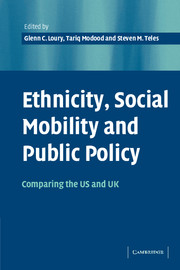Book contents
- Frontmatter
- Contents
- List of figures
- List of tables
- List of contributors
- Acknowledgements
- Introduction
- Part I Historical overviews
- Part II Informal social networks
- Part III Formal structures
- Part IV Political institutions and processes
- Part V Normative analysis
- 20 Race, inequality and justice in the USA: some social-philosophic reflections
- 21 Achieving racial equality
- Author index
- Subject index
- References
21 - Achieving racial equality
Published online by Cambridge University Press: 22 September 2009
- Frontmatter
- Contents
- List of figures
- List of tables
- List of contributors
- Acknowledgements
- Introduction
- Part I Historical overviews
- Part II Informal social networks
- Part III Formal structures
- Part IV Political institutions and processes
- Part V Normative analysis
- 20 Race, inequality and justice in the USA: some social-philosophic reflections
- 21 Achieving racial equality
- Author index
- Subject index
- References
Summary
In this paper I do three things. I begin with a general discussion of the nature and basis of equality and show why human beings should be treated equally. Although racial equality shares much in common with other forms of equality, it is distinct in its nature and logic. I analyze its specificity and end by suggesting how best it might be achieved.
Why equality?
Equality is an extremely elusive concept. In mathematics, its original home, it generally means identity or substitutability. To say that “two plus two equal four” is to say that “four” is the same as and can always be substituted for “two plus two,” and vice versa. It cannot have the same meaning in relation to human beings who are unique and by definition nonsubstitutable and different. Basically equality in a human context implies a status or a standing. To maintain that human beings are (or should be) equal is to say that they enjoy the same moral status, that none of them is inherently superior or inferior, and that none should be treated differently from another unless they are different in relevant respects.
Human beings do not have a status in the same way that they have eyes and ears. It is something that we ascribe to or rather confer on them. Empirically human beings are similar or different, not equal or unequal.
- Type
- Chapter
- Information
- Ethnicity, Social Mobility, and Public PolicyComparing the USA and UK, pp. 602 - 617Publisher: Cambridge University PressPrint publication year: 2005



